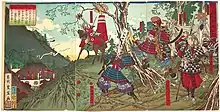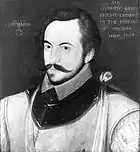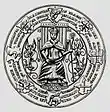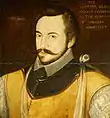1583
1583 (MDLXXXIII) was a common year starting on Saturday of the Gregorian calendar and a common year starting on Tuesday of the Julian calendar, the 1583rd year of the Common Era (CE) and Anno Domini (AD) designations, the 583rd year of the 2nd millennium, the 83rd year of the 16th century, and the 4th year of the 1580s decade. As of the start of 1583, the Gregorian calendar was 10 days ahead of the Julian calendar, which remained in localized use until 1923.
| Millennium: | 2nd millennium |
|---|---|
| Centuries: | |
| Decades: | |
| Years: |
| 1583 by topic |
|---|
| Arts and science |
|
| Leaders |
|
| Birth and death categories |
| Births – Deaths |
| Establishments and disestablishments categories |
| Establishments – Disestablishments |
| Works category |
|
| Gregorian calendar | 1583 MDLXXXIII |
| Ab urbe condita | 2336 |
| Armenian calendar | 1032 ԹՎ ՌԼԲ |
| Assyrian calendar | 6333 |
| Balinese saka calendar | 1504–1505 |
| Bengali calendar | 990 |
| Berber calendar | 2533 |
| English Regnal year | 25 Eliz. 1 – 26 Eliz. 1 |
| Buddhist calendar | 2127 |
| Burmese calendar | 945 |
| Byzantine calendar | 7091–7092 |
| Chinese calendar | 壬午年 (Water Horse) 4279 or 4219 — to — 癸未年 (Water Goat) 4280 or 4220 |
| Coptic calendar | 1299–1300 |
| Discordian calendar | 2749 |
| Ethiopian calendar | 1575–1576 |
| Hebrew calendar | 5343–5344 |
| Hindu calendars | |
| - Vikram Samvat | 1639–1640 |
| - Shaka Samvat | 1504–1505 |
| - Kali Yuga | 4683–4684 |
| Holocene calendar | 11583 |
| Igbo calendar | 583–584 |
| Iranian calendar | 961–962 |
| Islamic calendar | 990–991 |
| Japanese calendar | Tenshō 11 (天正11年) |
| Javanese calendar | 1502–1503 |
| Julian calendar | Gregorian minus 10 days |
| Korean calendar | 3916 |
| Minguo calendar | 329 before ROC 民前329年 |
| Nanakshahi calendar | 115 |
| Thai solar calendar | 2125–2126 |
| Tibetan calendar | 阳水马年 (male Water-Horse) 1709 or 1328 or 556 — to — 阴水羊年 (female Water-Goat) 1710 or 1329 or 557 |

May: Battle of Shizugatake
Events

January–June
- January 18 – François, Duke of Anjou, attacks Antwerp.
- February 4 – Gebhard Truchsess von Waldburg, newly converted to Calvinism, formally marries Agnes von Mansfeld-Eisleben, a former canoness of Gerresheim, while retaining his position as Archbishop-Elector of Cologne.
- March 10 – The Queen Elizabeth's Men troupe of actors is ordered to be founded in England.
- May – Battle of Shizugatake in Japan: Shibata Katsuie is defeated by Toyotomi Hideyoshi, who goes on to commence construction of Osaka Castle.[1]
- May 22 – Ernest of Bavaria is elected as Roman Catholic Archbishop of Cologne, in opposition to Gebhard Truchsess von Waldburg. The opposition rapidly turns into armed struggle, the Cologne War within the Electorate of Cologne, beginning with the Destruction of the Oberstift.
July–December
- July 25 – Cuncolim Revolt: The first documented battle of India's independence against a European colonial ruler is fought by the Desais of Cuncolim in Goa, against the Portuguese.
- August 5 – Sir Humphrey Gilbert, on the site of the modern-day city of St John's, Newfoundland, claims the island of Newfoundland on behalf of England, marking the beginning of the British Empire.
- August 19 – Petru Cercel enters Bucharest, and becomes Prince of Wallachia.
- August 29 – English ship Delight, with Humphrey Gilbert's expedition, becomes the first of over 350 ships over time to run aground and be wrecked on Sable Island in the North Atlantic.[2]
- December 17 – Cologne War: The Siege of Godesberg (begun on November 18) concludes, when Catholic forces under Prince-elector-archbishop Ernest of Bavaria capture the strategic position, from defenders of the Calvinist convert Gebhard Truchsess von Waldburg.
Date unknown
- The world's oldest, intact, still-surviving amusement park, Dyrehavsbakken, is founded north of Copenhagen.
- The Bunch Of Grapes Pub is built on Narrow Street, London.[3] Referred to by Charles Dickens in Our Mutual Friend as "The Six Jolly Fellowship Porters", it still stands in the 21st century, much rebuilt and renamed The Grapes.
- 28 May until 9 November – The first translation of the complete Bible into Slovene: Bibilija, tu je vse svetu pismu stariga inu noviga testamenta, slovenski tolmačena skuzi Jurija Dalmatina (work by Jurij Dalmatin, 1578) is published in Wittenberg.
- The Ottoman fleet crosses into the Western Mediterranean and raids the Italian coastline. In Corsica, the towns of Sartene and Arbellara are sacked (summer).
Births

Peter Bulkley

Albrecht von Wallenstein
- January 8 – Simon Episcopius, Dutch theologian (d. 1643)
- January 12 – Niccolò Alamanni, Greek-born Roman antiquarian (d. 1626)
- January 31 – Peter Bulkley, English and later American Puritan (d. 1659)
- February 4 – John Ley, English priest (d. 1662)
- February 17 – Johann Heinrich Alting, German Lutheran theologian (d. 1644)
- February 23 – Jean-Baptiste Morin, French mathematician (d. 1656)
- March 3 – Edward Herbert, 1st Baron Herbert of Cherbury, English diplomat, poet, and philosopher (d. 1648)[4]
- April 4 – Franciscus Quaresmius, Italian writer and orientalist (d. 1650)
- April 8 – Nikolaus, Count Esterházy, Hungarian noble (d. 1645)
- April 10 – Hugo Grotius, Dutch philosopher and writer (d. 1645)[5]
- May 1 – Orazio Grassi, Italian Jesuit priest, architect and scientist (d. 1654)
- May 10 – Fernando Afán de Ribera, duke of Alcalá de los Gazules, Spanish diplomat (d. 1637)
- May 26 – Susanna Hall, Daughter of William Shakespeare (d. 1649)
- June 16 – Axel Oxenstierna, Lord High Chancellor of Sweden (d. 1654)
- June 20 – Jacob De la Gardie, Swedish soldier and statesman (d. 1652)
- June 22 – Joachim Ernst, Margrave of Brandenburg-Ansbach (1603–1625) (d. 1625)
- June 27 – Christopher von Dohna, German politician and scholar (d. 1637)
- July 2 – Dodo Knyphausen, German soldier (d. 1636)
- July 9 – John, Prince of Schleswig-Holstein, Danish prince (d. 1602)
- July 20 – Alban Roe, English Benedictine martyr (d. 1642)
- July 22 – Jacobus Trigland, Dutch theologian (d. 1654)
- August 19 – Daišan, Manchu politician (d. 1648)
- August 21
- August 26 – Adam, Count of Schwarzenberg, German politician (d. 1641)
- August 31 – Richard Harrison, English politician (d. 1655)
- September 23 – Christian II, Elector of Saxony from 1591 to 1611 (d. 1611)
- September 24 – Albrecht von Wallenstein, Austrian general (d. 1634)
- September 29 – John VIII, Count of Nassau-Siegen (1623–1638) (d. 1638)
- September – Girolamo Frescobaldi, Italian composer (d. 1643)[6]
- October 22 – Laurens Reael, Dutch admiral (d. 1637)
- November 10 – Anthony Günther, Count of Oldenburg (d. 1667)
- November 15 – Théophile Raynaud, French theologian (d. 1663)
- November 17 – Archduke Maximilian Ernest of Austria, Austrian archduke (d. 1616)
- November 24 – Juan Martínez de Jáuregui y Aguilar, Spanish poet (d. 1641)
- December 25 – Orlando Gibbons, English composer (d. 1625)[7]
- date unknown
- Hendrick Jacobszoon Lucifer, Dutch pirate and buccaneer (d. 1627)
- John Beaumont, English poet (d. 1627)
- Bonaventura Elzevir, Dutch printer (d. 1652)
- Stanisław Lubomirski, Polish nobleman (d. 1649)
- Philip Massinger, English dramatist (d. 1640)
- Hayashi Razan, Japanese neo-Confucianist scholar (d. 1657)
- probable
Deaths

King Magnus of Livonia

Humphrey Gilbert
- January 7 – Maria of Saxony, Duchess of Pomerania (b. 1515)
- January 22 – Antoinette de Bourbon, French noblewoman (b. 1493)
- January 28 – Pier Francesco Orsini, Italian condottiero and art patron (b. 1523)
- February 27 – Richard Madox, English explorer (b. 1546)
- March 24 – Hubert Goltzius, Dutch Renaissance painter-engraver (b. 1526)
- March 28 – King Magnus of Livonia (b. 1540)
- April – Lucas David, Prussian historian (b. 1503)
- April 17 – Ogasawara Nagatoki, Japanese daimyō (b. 1519)
- May 6 – Zacharias Ursinus, German theologian (b. 1534)
- May 23 – Günther XLI, Count of Schwarzburg-Arnstadt (b. 1529)
- June 6 – Nakagawa Kiyohide, Japanese military commander (b. 1556)
- June 9 – Thomas Radclyffe, 3rd Earl of Sussex, Lord-Lieutenant of Ireland (b. 1525)
- June 14 – Shibata Katsuie, Japanese military commander (b. 1522)
- June – Babullah of Ternate, Sultan of Ternate (b. 1528)
- July 1 – Sakuma Morimasa, Japanese samurai and warlord (beheaded) (b. 1554)
- July 6 – Edmund Grindal, Archbishop of Canterbury (b. 1519)
- August 22 – Marcantonio Maffei, Italian archbishop and cardinal (b. 1521)
- September 9 – Humphrey Gilbert, English explorer (b. c. 1537)
- September 16 – Catherine Jagiellon, queen of John II of Sweden (b. 1526)
- September 27 – Elisabeth Plainacher, Austrian alleged witch (b. 1513)
- October 22 – Louis VI, Elector Palatine (b. 1539)
- November 11 – Gerald FitzGerald, 14th Earl of Desmond, Irish rebel (b. c. 1533)
- November 24 – René de Birague, French cardinal and chancellor (b. 1506)
- December 16 – Ivan Fyodorov, Russian printer
- December 23 – Nicolás Factor, Spanish artist (b. 1520)
- December 31 – Thomas Erastus, Swiss theologian (b. 1524)
- date unknown
References
- James Murdoch (1964). A History of Japan: During the century of early foreign intercourse (1542-1651). F. Ungar Publishing Company. p. 193.
- "HMS Delight – 1583". Maritime Museum of the Atlantic. Retrieved January 22, 2022.
- "The London Charles Dickens Knew Archived April 25, 2012, at the Wayback Machine", walksoflondon.co.uk.
- A History of English Philosophy. CUP Archive. p. 35.
- Christian Gellinek (1983). Hugo Grotius. Twayne Publishers. p. 1. ISBN 978-0-8057-6525-0.
- Sandy Feldstein (1995). Alfred's Pocket Dictionary of Music. Alfred Music. p. 135. ISBN 978-1-4574-2215-7.
- The Musical Antiquary. Gregg International Publishers. 1968. p. 62.
This article is issued from Wikipedia. The text is licensed under Creative Commons - Attribution - Sharealike. Additional terms may apply for the media files.